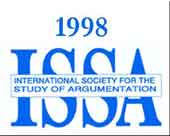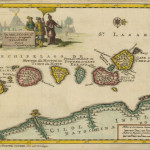ISSA Proceedings 1998 – Totalitarian Argumentation: Theory And Practice
No comments yet In the history of the 20-th century totalitarianism has left a deep and bloody trace. It has been connected not only with destroying civil public institutes and different deformations of people’s private and social life. This century totalitarianism turned out to be an Intellect of Devil with a capital letter which forced people to realize the necessity of replacing monistic Ratio by numbers of autonomous and competing with each other intellect instances. The connection between totalitarianism and intellect is paradoxical. Destroying the intellect with a small letter and thus discrediting the great Ratio totalitarianism created special communicative practices.
In the history of the 20-th century totalitarianism has left a deep and bloody trace. It has been connected not only with destroying civil public institutes and different deformations of people’s private and social life. This century totalitarianism turned out to be an Intellect of Devil with a capital letter which forced people to realize the necessity of replacing monistic Ratio by numbers of autonomous and competing with each other intellect instances. The connection between totalitarianism and intellect is paradoxical. Destroying the intellect with a small letter and thus discrediting the great Ratio totalitarianism created special communicative practices.
It’s wrong to believe that the power of totalitarianism can be explained exceptionally by the power of its repressive structures. A great role in its expansion is played by unrepressive mostly [first of all] verbal practices the core of which was an argumentation. “Argumentation is a social, intellectual, verbal activity serving to justify or refute an opinion, consisting of a constellation of statements and directed towards obtaining the approbation of an audience” (Eemeren, Grootendorst, Kruiger 1987:7). Argumentation is a way of human deeds coordination.
As Ch. Perelman says, that activity is the communication of intellects, American philosofer H.W. Yohnstone says, that activity is the most adequate way of realizing the human nature.In connection with totalitarianism argumentation becomes the devil of homo sapiens and needs the most serious attention. Analysing it we may probably come to answer the question inspired by H. Arendt: How a physically normal healthy person may lose the interest to his own beinq to realize himself as a screw, soldier of Totalitarian one. (Arendt 1951) Totalitarianism isn’t the antipode of democracy, but its another genesis, plebiscite-acclamatorian form, as J. Habermas says on the point. Some democracy theorists consider that totalitarianism and democracy are antipodes. There are two forms of democracy: a representative democracy and a democracy of participation “For the survival of democracy in Eastern Europe, where touch economic and social measures are to be taken, participation is a prereguisite. But more participation will also be indispensable in solving some of the problems inherent in the democratic system institutionalised in the West” (Eemeren 1996:9) Only an inaccurate look perceives acclamation as one of false democracy. The estimation of totalitarianism as extermal displaying of dominatuion and as a false arche is also simplified. It’s more realistic without declaring the totalitarianism visibility what is forbidden by the voice of its victims, which is knocking in the contemporaries hearts, to try to understand which properties the argumentation must have to be an effective megaphone ,the way of totalitarianism implementation. These properties were dissolved in communicative practices of totalitarianism and were not recorded by means of language.
On the one hand,we can’t speak about one as totalitarian one without putting it into a complete totalitarian content. The concept of “totalitarian control” will be intelligent if and only if, the control will be really total.
On the other hand, the control can’t be organized. A screw of the totalitarian State isn’t an atom in sense of Epicurus and isn’t capable of self deviation.Totalitarian argumentation must provide forming of a screw, which is capable of self deviation in principle as a screw. We conducted an empirical analysis of totalitarian argumentation features based on the content analysis of the Soviet press, and it enables to note the following features of totalitarian argumentation. Soviet republican and regional newspapers in 1950-s had practically no one issue which didn’t contain a totalitarian argumentation text. Usually, there were two or three messages in one issue which couldn’t be qualified as patterns of the totalitarian argumentation usage.
Studying these messages shows that there were communicative, control and motive-organizing functions of totalitarian argumentation. Any problem discussed in the newspaper’s texts we are interested in was covering in the way to set up an invisible control over intellects and hearts of the readers using its ideology.
An empirical study of structural properties of totalitarian argumentation shows that in the epoch of stalinism the motive – organising function of totalitarian argumentation was not connected with such argumentation elements (according to St. Toulmin) as qualifier and rebuttal. It’s not surprising that almost 80 per cent of odinary totalitarian messages were built with a peripheral course (O’Keefe 1995) of persuasion. They were based on using very simple and primitive arguments oriented on actualization of the masses’ basic instincts. The processual structural properties of totalitarian argumentation were connected with a canon compound (in sense of F. van Eemeren) argumentation.
According to the canon argumentation is the system all elements of which are intelligent only in the totalitarian total message context. We discovered compound argumentation in 60,5 per cent of analyzed totalitarian issues.
One may speak about such property of totalitarian argumentation as strategy of of its claim immunization (Andersen 1995:193). According to the strategy a slight criticism of the claim of totalitarian argumentation is strengthening its persuasiveness and acceptance. That strategy was used in 70 per cent of analyzed totalitarian messages.
Between relatively independent elements of totalitarian argumentation text as something whole such subarguments as arguments to authority, provincialism, death are notable. An argument to the authority (or ad verecundiam) can be effective due to totalitarian power mechanism. A listener is more likely to accept what State says the more he is afraid of it.This argument is a special totalitarian kind of argument ad verecundiam. Even such a statement as “Elephants Fly” backed by the Authority of a Totalitarian State is acceptable to its recipients.
An argument to provincialism was very widespread in the USSR and is used in the CIS. It means that somethiang is unacceptable to an audience if it is connected with a deviation from the general canon of totalitarian ideology. This deviation is special kind of ignorance in sense of once’s unability to accept totalitarian ideas. An argument to provincialism is a totalitarian turned form of the argument ad ignorantiam.
There are three levels of an argument to death: logical, rhetorical and dialectical. Syllogisms: “All humans are mortal; Socrates is a man; Socrates is mortal” is an example of ‘argument to death’ logical version. It illustrates a high level of validity and persuasiveness of a verbal message appealing to limits of life. ‘Argument to death’ rhetorical form appealing to limits of human life may be persuasive not being valid in a logical sense.
What is more this form may be logically contradictory’. The argument to death’ dialectical form illustrates principle impossibility to continue human intercourse after the use of argument to death. This argument shows an unsteady border between totalitarian argumentation as an example of the verbal violence and totalitarian physical repressions as a brutal and bloody force. The most popular for users of totalitarian argumentation were the arguments located in the following order: to[ad] authority, death, provincialism. If the argument to authority in totalitarian argumentation being subargument played a role of support also, the next arguments to provincialism and death, being relatively independent subarguments, were connected with the methods of totalitarian statements backing.
Despite the ordinary structure and organisation of totalitarian argumentation in the epoch of stalinism internally, it was a rather complex formation being very dynamic and relatively independent phenomenon in comparison with its supporting state institutes.
REFERENCES
Eemeren, F.H. van, R.Grootendorst. T.Kruiger (1987) Handbook of Argumentation theory. Dordrecht: Foris Publications.
Arendt, H. (1951) The origins of Totalitarrianism. New York.
Eemeren, F.H. van, Argumentation and Democracy (1996) Speech Communication and argumentation Vol. 2. Sanct-Petersburg.
Anderson St. K.(1995). ‘War propaganda, argumentation, and the public sphere(s)’. Special Fields and Coses-Proceedings of the 3 ISSA Conference on Argumentation. Eemeren F.H. van, R. Grootendorst. Amsterdam Sic Sat. 1995. Vol.IV.
You May Also Like
Comments
Leave a Reply





